
by Eladrin
Hello Stellaris Cube-munity!
Today’s dev diary looks at the civics and “kilostructures” in The Machine Age, as well as looking at a 3.12 “Andromeda” feature – Auto-Modding.
As with all of our previews, some of this is still in development, so there are still some placeholder icons and some details may still change before release. (Which is good, since it lets us incorporate some of your feedback.)

Let’s go through each of the new civics that are coming in The Machine Age in detail.
Guided Sapience civics
The Guided Sapience civics focus on coexistence with natural or created pre-sapient species and the environment around them. Their homeworld and Genesis Ark colony ships uplift some of the most promising local wildlife to pre-sapient status, creating a Genesis Preserve that increases Society Research and Unity.
The bonuses from the Genesis Preserve are doubled on Gaia worlds.
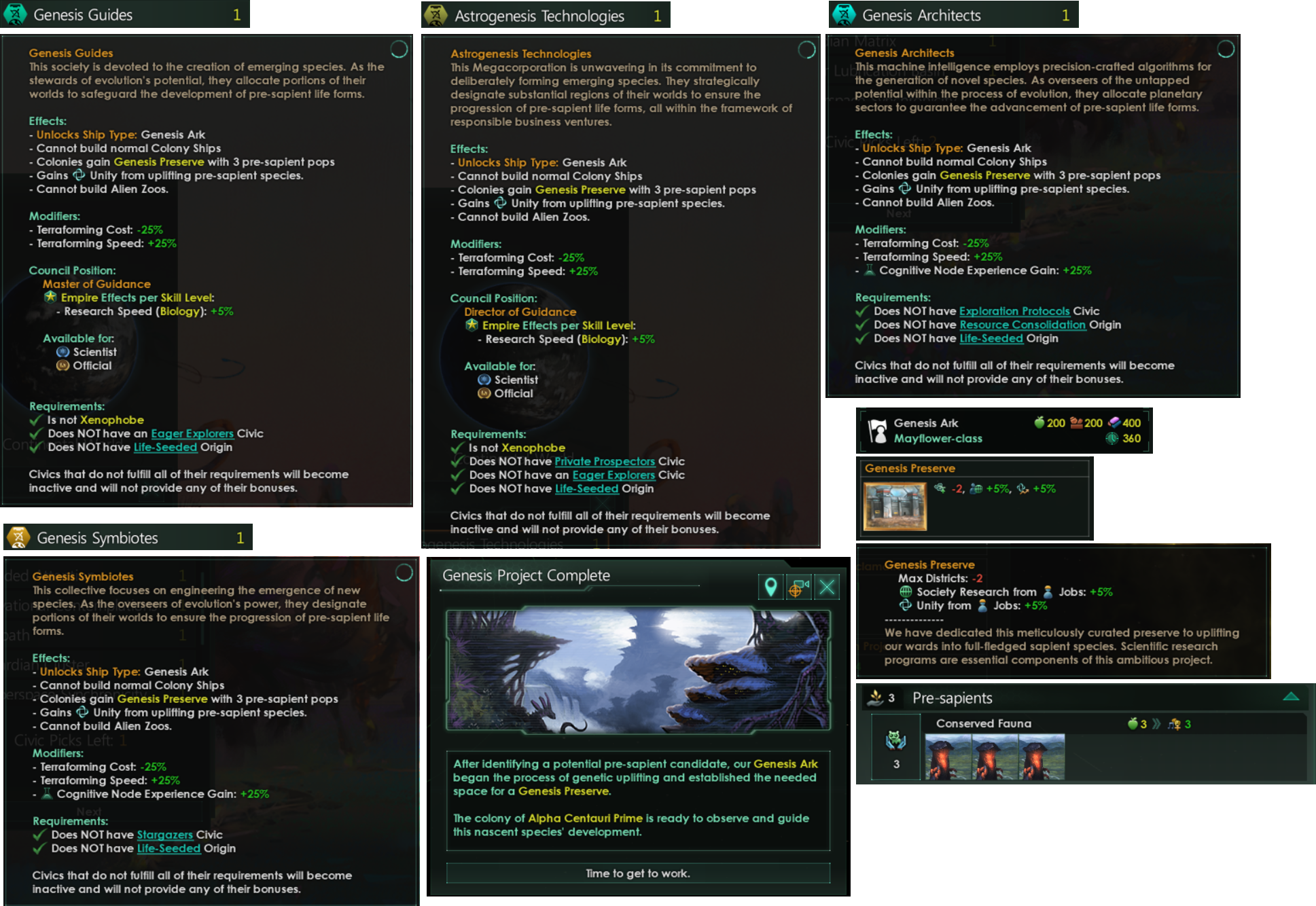
Not listed in these screenshots, but other “hostile” civics like Devouring Swarm and origins like Necrophage are also excluded from these.
Natural Design civics
While other empires seek to improve themselves through genetic modification or through ascension, others are quite certain that they are already at the apex of evolution.
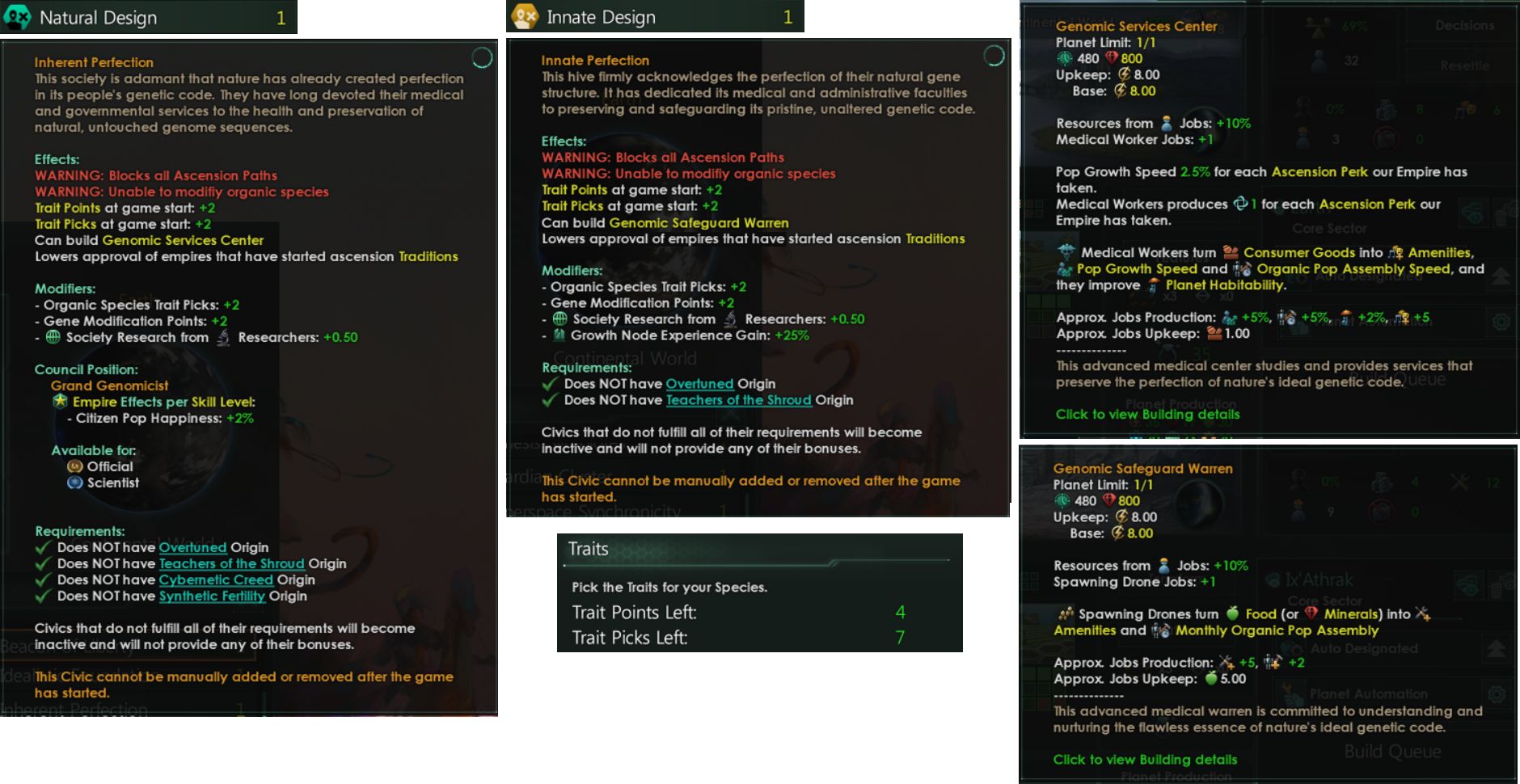
02_INSULT_CLOTHES:0 “Behold the [From.GetSpeciesAdj] form, glorious and bared for all to admire. Contrast with the paltry [Root.GetSpeciesNamePlural], cowering under their layers of cloth, knowing that the world does not want to see their sad frames.”
Obsessional Directive
In 2003, human philosopher and professor Nick Bostrom created a thought experiment about the potential existential threat an artificial general intelligence could pose even if given seemingly harmless directives.
Nick Bostrom said:
Suppose we have an AI whose only goal is to make as many paper clips as possible. The AI will realize quickly that it would be much better if there were no humans because humans might decide to switch it off. Because if humans do so, there would be fewer paper clips. Also, human bodies contain a lot of atoms that could be made into paper clips. The future that the AI would be trying to gear towards would be one in which there were a lot of paper clips but no humans.
Available to gestalt machine intelligences, Obsessional Directive lets you enjoy faulty programming that drives you to produce ever increasing numbers of useless Consumer Goods… At any cost.
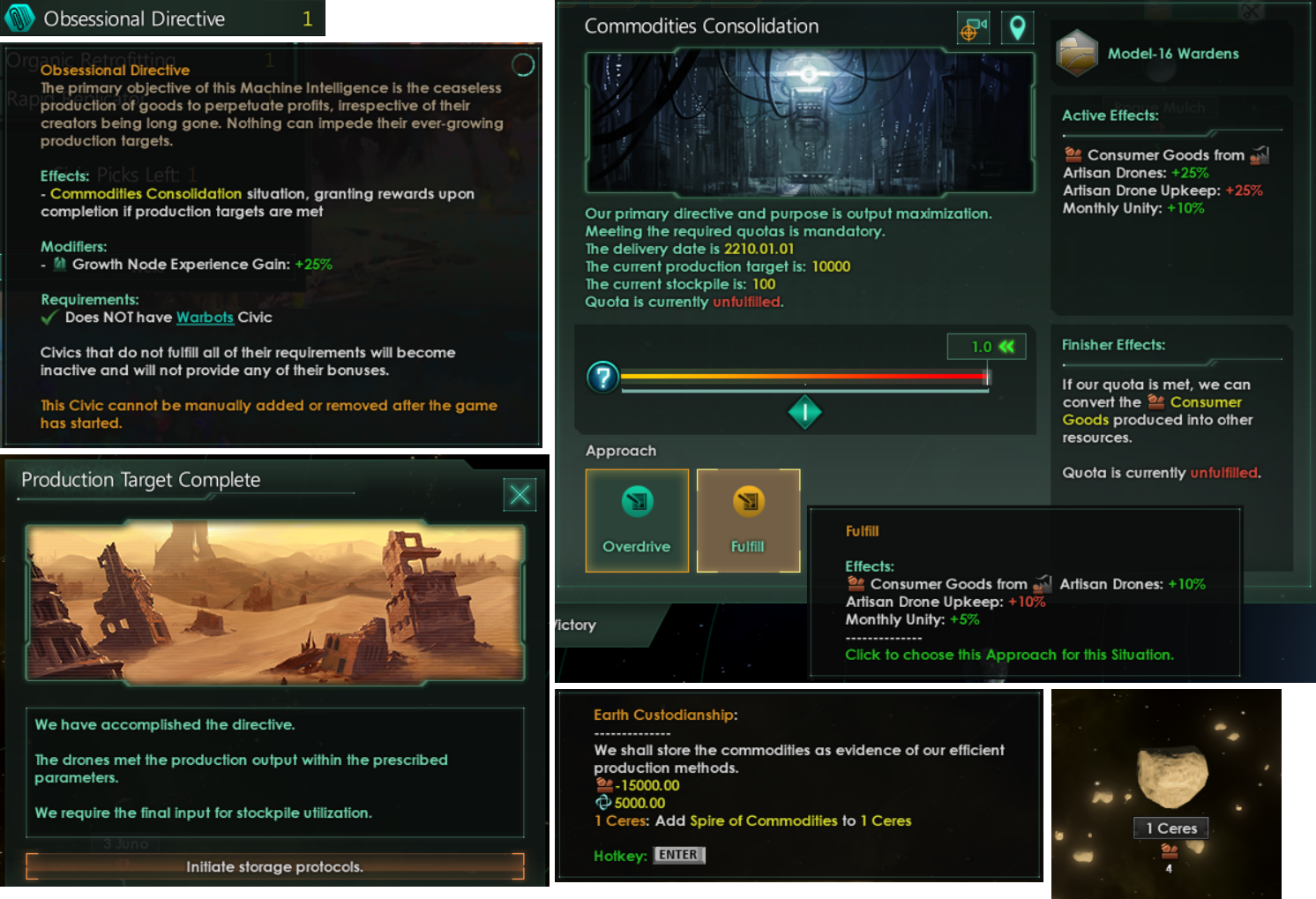
Object permanence is not necessarily one of your strengths.
The directive was to acquire the consumer goods, now that you’re done, there’s nothing preventing you from digging them back up again.
If you meet or exceed your quota, you will have options regarding what to do with your stash of office supplies, toasters, handheld electronics, or whatever other form you imagine your Consumer Goods take. Until you make friendly contact with other empires you will only have the option to create a Spire of Commodities, but later on you could trade them away for various resources. Most of your consumer goods will be removed, but the reward will scale with the amount that you produced.
Failing to meet your quota will result in a bit of a breakdown until your new, lower quota is met. On the other hand, the experience of failure does unlock a new “direct to Consumer Goods” purge type to make it easier to achieve your next goal. (Determined Exterminators start with this purge type unlocked.)
Diplomatic Protocols
In The Machine Age, gestalt Machine Intelligences will also be getting their own variant of the diplomatic civics.
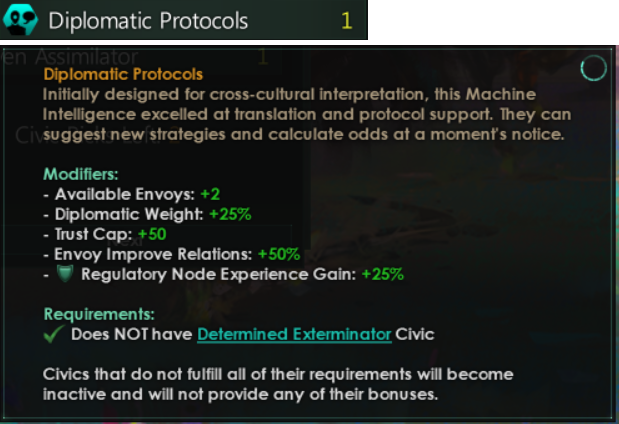
The other diplomatic civics have also been buffed to match the Diplomatic Protocols.
Tactical Algorithms
Some machines were designed to study war in all its forms.
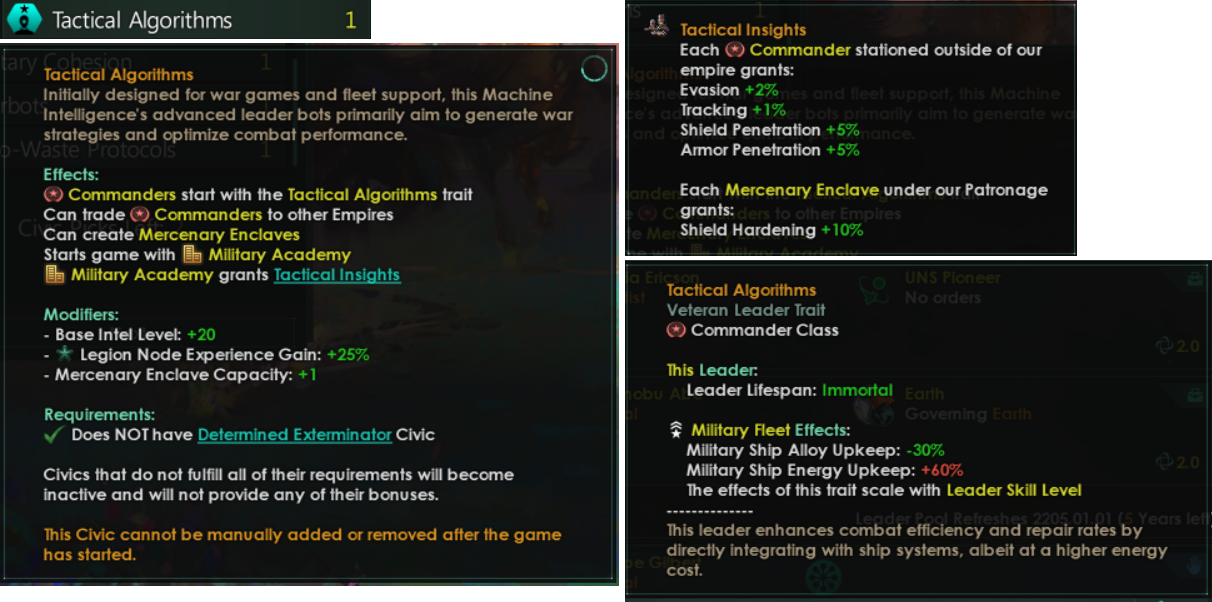
How about a nice game of chess?
These gestalt Machine Intelligences can create Mercenary Enclaves (if the game host has Overlord), have immortal Commanders, and gain military benefits from getting the opportunity to study the strategy and tactics of other empires.
Augmentation Bazaars
At the Augmentation Bazaars, you can build a better you, and all it will cost is an arm and a leg.
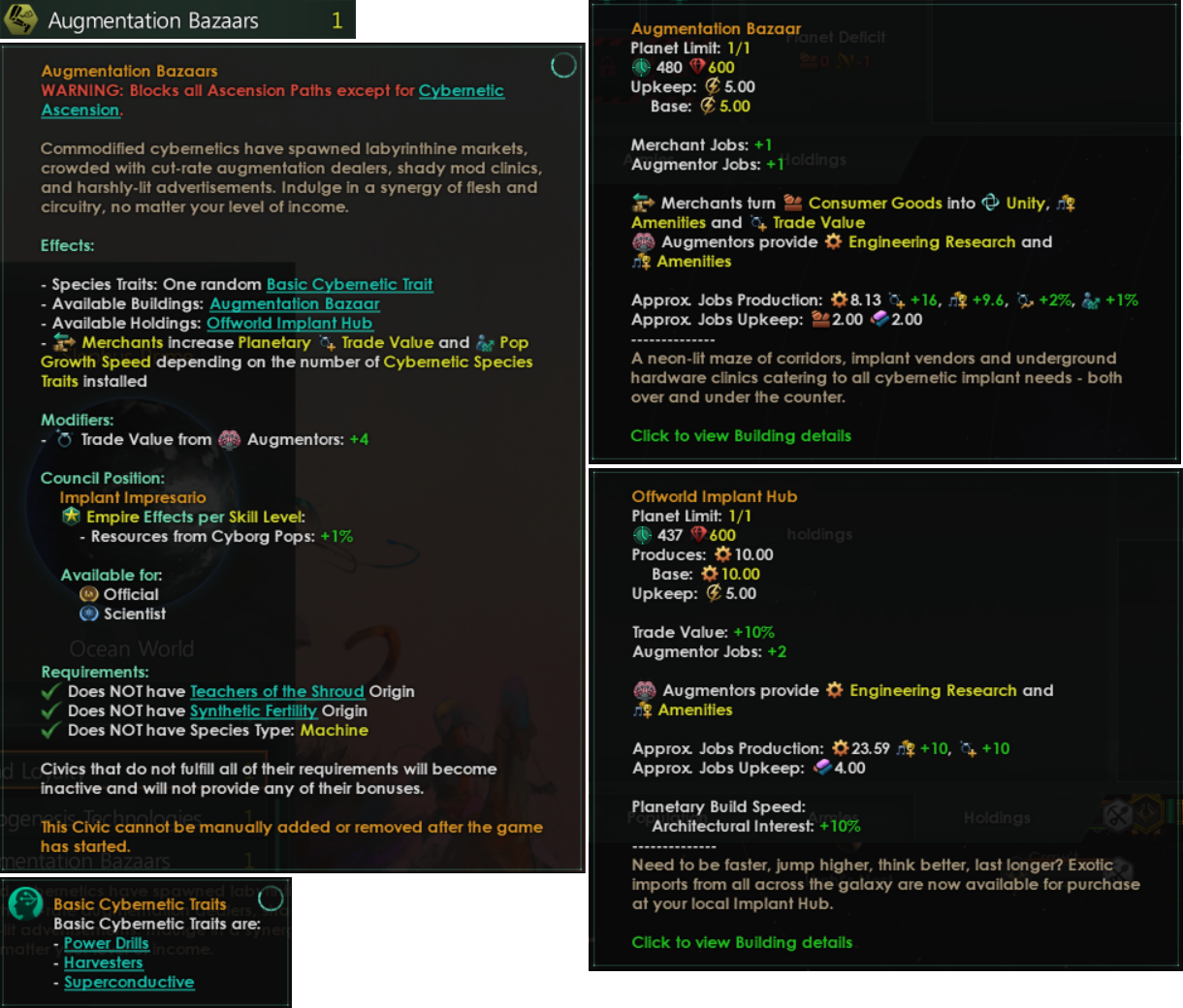
Now I’ll let Gruntsatwork talk about some new space structures.
The path to a Dyson Sphere of your own is long and arduous, filled with empty building platforms and non-functional intermediate stages, or at least, it used to be.
Fresh with the Machine Age, we are introducing the Dyson Swarm, a predecessor and proof of concept for your Dyson Sphere plans. By putting many small satellites into orbit around a star, you can collect some of its output and enhance your research capabilities. But Paradox you say, we don’t get research from Dyson Spheres. Correct, but you do get it from Dyson Swarms, IF you place them correctly.
Dyson Swarms function slightly differently than Spheres. Instead of producing energy all on their own, they amplify whatever resources their star produces, up to 30 times. Yes, that delicate little 3 energy star will now produce 90 energy and if you were to put it on a 3 physics star, that would be a decent 90 physics research from 1 star.
And if you get really lucky and have an event spawn an even rarer resource on a star? Go right ahead, collect it all.
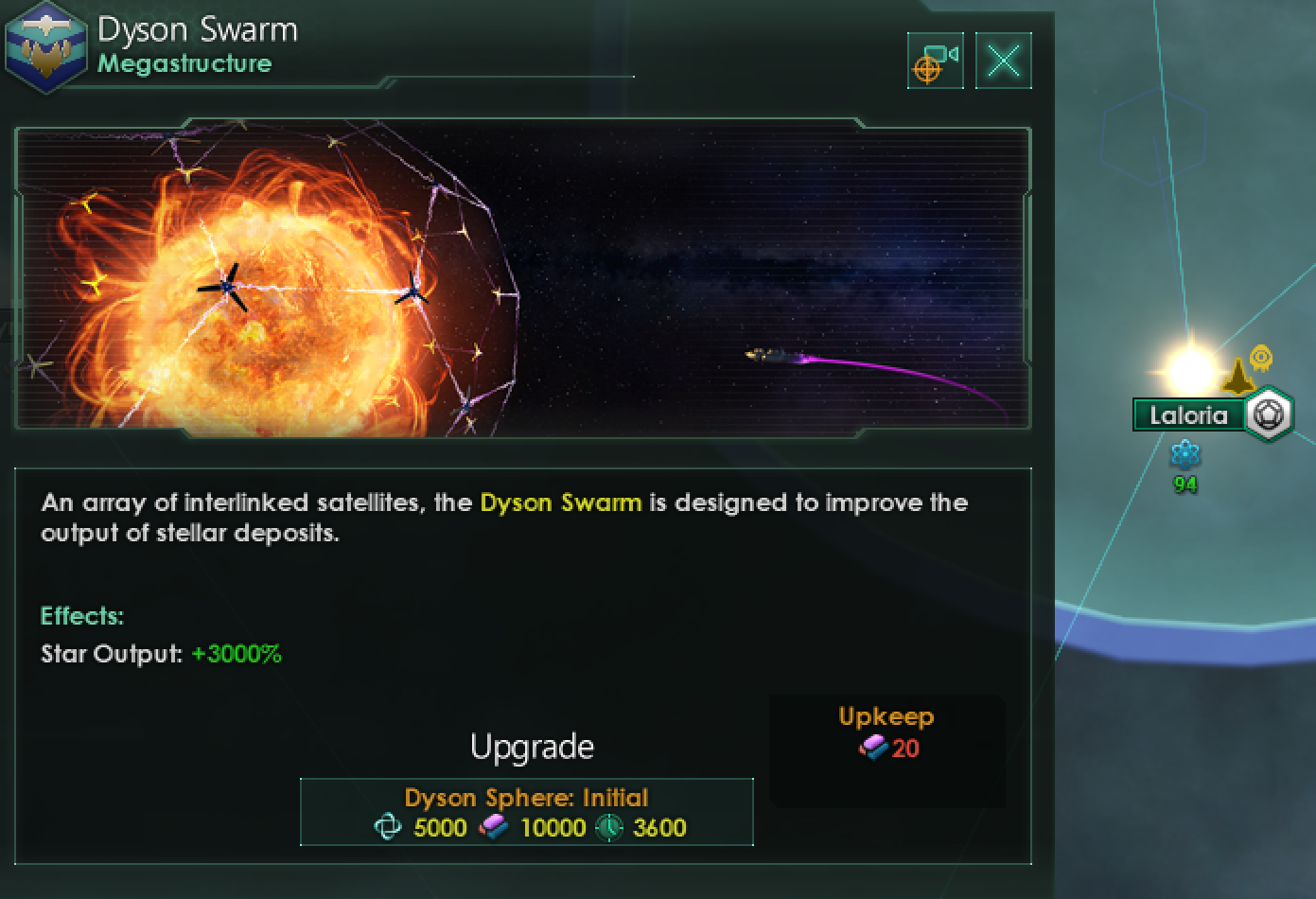
So swarmy.
But with all that said, there are certain restrictions on building Dyson Swarms. Those restrictions exist for a simple reason. You can upgrade one of your Swarms directly into a Stage 2 Dyson Sphere, for those juicy 1000 energy per month.
That is why you may not build Swarms around Black Holes, Neutron Stars nor upgrade them past Swarm state in systems with thriving colonies.
For our second new Kilostructure, allow me to introduce the Arc Furnace to you. A splendid planet-based megastructure, meant to help you alleviate your industrial needs.
Just like the Dyson Swarm, to get the most out of your shiny new Arc Furnace requires a bit more effort than merely finding a molten world and putting it down. Instead of producing resources itself, it allows you access to more of the systems resources.
In less flowery language, that means at each stage, the Arc Furnace will create deposits on every planet or asteroid in the system. First 1 Mineral deposit, then another 1 Mineral deposit. Third 1 Mineral and 1 Alloy and for the final and fourth stage, 1 more Alloy deposit.
This gives you a total of 3 Minerals and 2 Alloys on every planet or asteroid in the system, however, in addition to the deposits, the Ard Furnace also makes mining in general more effective in the system, which manifests as a small bonus to your mining station output, at the final stage a measly 100%.
So to get the most out of your Arc Furnace, you want to find molten worlds in large systems, with plenty of planets and asteroids.
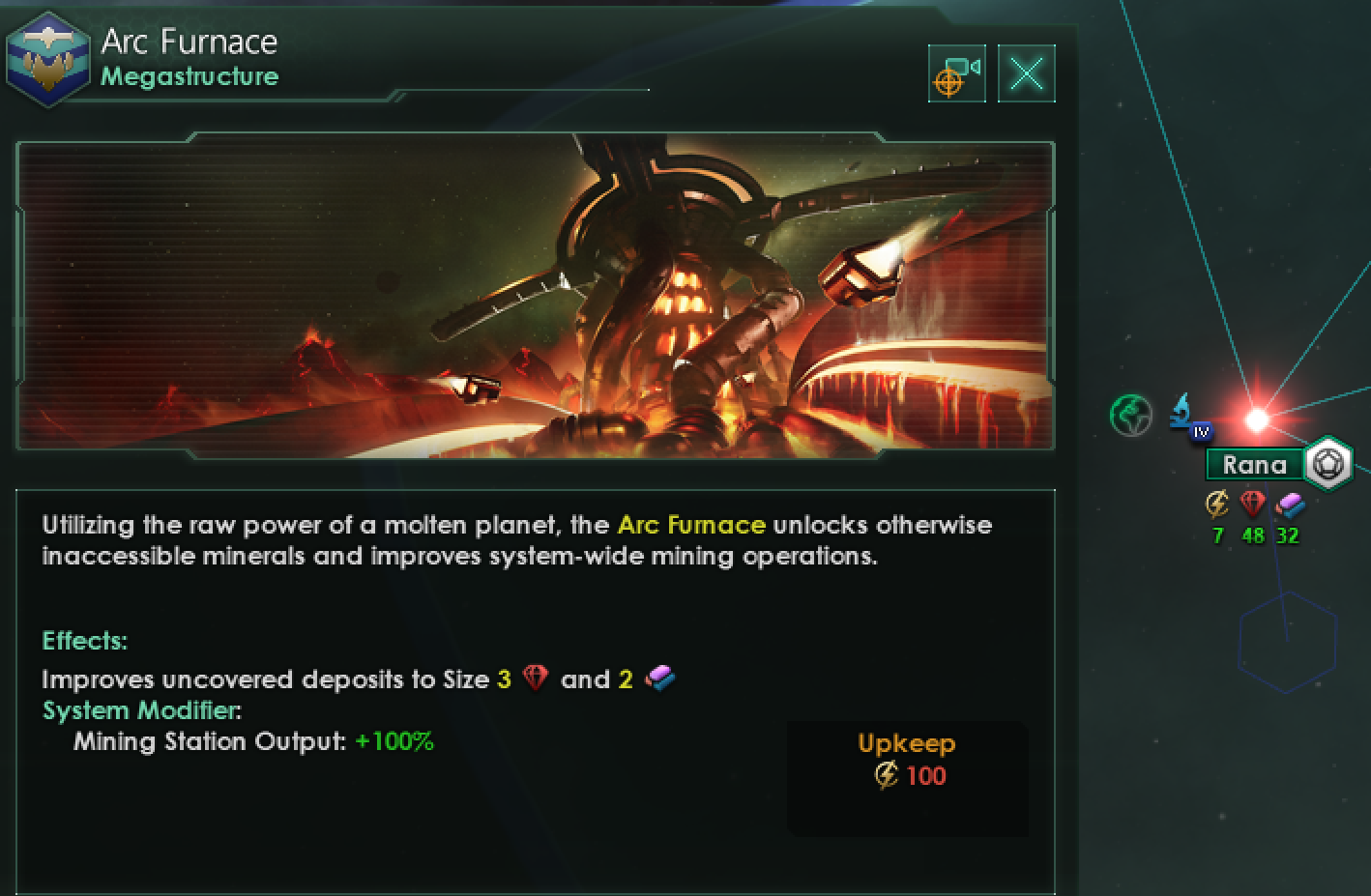
Hot.
Both of those Kilostructures will become available in the early midgame, hopefully around the time you start to feel the constraints on your expansion as borders solidify and you begin to get cut off from the resources you desperately need.
Now in contrast to most Megastructures you are not limited to merely 1 of each, however, unlike Relays and Gates they have some limits. You will unlock the capacity to build 5 of these in total, spread out through the relevant technologies (6 for Arc Welders).
I’m back now to talk about Auto-Modding. No, we’re not automatically updating your outliner mod for you when an update releases. (Sorry modders!)
Biological and Cybernetic Ascensions were particularly vulnerable to being very micromanagement heavy playstyles. You had a lot of power available to you if you adjusted, tweaked, and applied various species templates to your pops. This was effective, but very time consuming and often tedious.
With the 3.12 “Andromeda” update, we have introduced a new class of traits that will, over time, replace themselves with temporary versions of other traits based on the job the pop is currently filling. For example, a Machine pop filling a Farmer job will eventually have their Adaptive Frames change to replicate the Harvesters trait, and if they move to a Mining job they’ll eventually switch to mimicking Power Drills.
AutoMod traits have a defined list of available traits to choose from for each trait, and one pop per month will adapt to their jobs, modified by buildings like the Robot Assembly Plants or Gene Clinics.
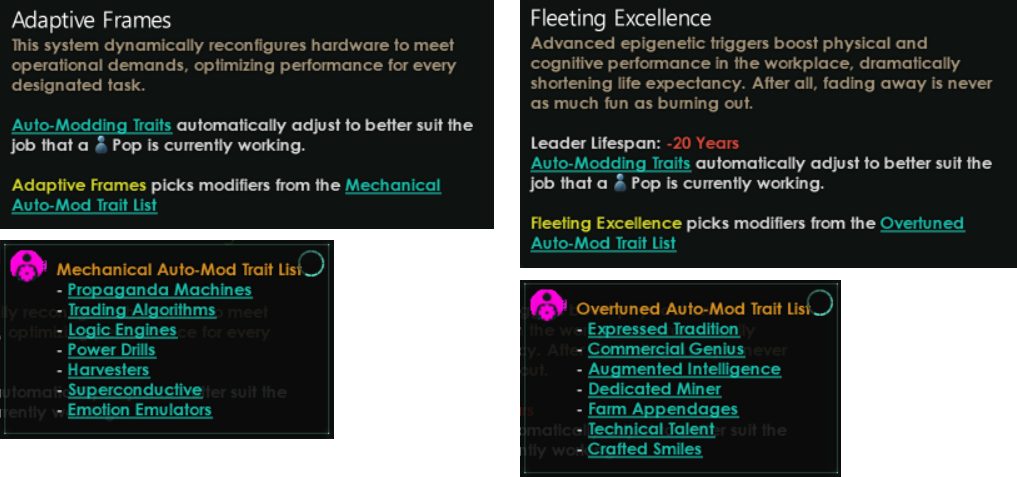
AutoMod traits exist for Mechanical (Adaptive Frames), Biological (Vocational Genomics), Cybernetics (Universal Augmentations), and Overtuned Traits (Fleeting Excellence).
Vocational Genomics becomes available with the Targeted Gene Expression technology, and the others are immediately available once you have access to the appropriate category of traits.
We recognize that these traits are extremely strong, but the quality of life benefits of having your pops modify themselves to fit their jobs is very high. As such, Auto-Modding and the associated traits are part of the free 3.12 “Andromeda” release.
MODDING INFORMATION
Traits can now be categorized into normal/cyborg/robotic/psionic/advanced_genetic/overtuned.
Here’s the script for the biological auto_mod trait:
TRAIT_AUTO_MOD_BIOLOGICAL
}
Traits themselves should also include a category if you want them to be included as auto_mod possibilities:
TRAIT_AGRARIAN
}
Jobs themselves need to have a list of traits associated with them. We’ve created a number of inline scripts to handle these.
So our farmer job has the following inline script at the end of the script block:
Which expands into:
AUTO_TRAIT_PRIO
}
Next week we’ll explore the new End-Game Crisis that’s coming in The Machine Age.
See you then!

